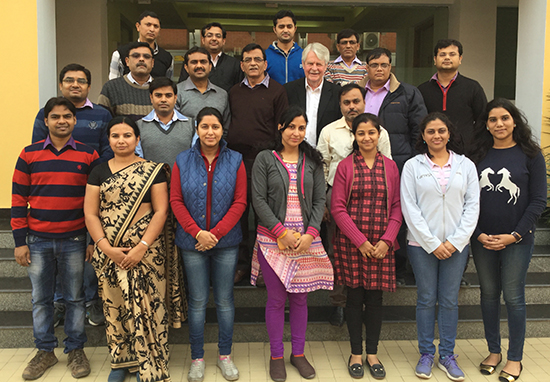Postal address: Avdelningen för Miljö- och energisystem, Institutionen för Teknik och Samhälle, LTH, Box 118, SE-221 00 Lund, Sweden
Visiting address: V-huset (John Ericssons väg 1)
Web page: http://miljo.lth.se/english/
Contact person: Professor Pål Börjesson, phone: +46 (0)46 222 8642
Environmental and Energy Systems Studies was established in 1969 as the Environmental Studies Programme. The main goal is to study issues of energy and the environment in a national and global long-term perspective. Researchers and teachers have backgrounds in various scientific disciplines including technology, natural science, economy, agronomy, political science, and sociology.
Research connected to South Asia

PhD candidate Shveta Soam the DBT-IOC Advanced Bioenergy Research Centre in Faridabad, India, is a guest researcher at the division during September-October 2015, funded by a SASNET South Asian short-term fellowship (more information). This is the second time coming to Lund, since she was at Lund University already in November 2014, as one of two Indian Oil Corporation researchers invited by the Department of Chemical Engineering.
Shveta is basically a botanist and environmentalist, with two masters degrees. Her PhD work focuses exclusively on Life Cycle Assessment of Biofuels. LCA is a technique to assess the environmental aspects and potential impacts associated with a product, process, or service, by: Compiling an inventory of relevant energy and material inputs and environmental releases. Evaluating the potential environmental impacts associated with identified inputs and releases. While being at Lund University, she works on the Life Cycle Assessment of fuel ethanol from rice straw in India. This is a great learning experience since in India there are no commercial pilot plants for ethanol production.
On Friday 23 October 2015, 10.30–12.00, she held a SASNET lecture on her research. The presentation was entitled ”Life Cycle Assessment of Biofuels in India and its Impact on Indian Biofuel Programme”. Venue: Lecture hall G, Chemical Centre, Sölvegatan 39, entrance B.
Abstract: Government of India in 2009 mandated a 10% ethanol blending target across 20 states and 4 union territories and has proposed to replace fossil based gasoline and diesel by using 20% biofuels by 2017. India’s biofuel programme relies mainly on the ethanol from molasses. Therefore, quantification of greenhouse gas (GHG) emissions and the energy consumed during the process of ethanol production is desirable to help policy makers to take meaningful decisions. Life Cycle Assessment (LCA) is one such tool to assess environmental aspects associated with a product, process or service. LCA concludes that fuel ethanol produced from sugarcane molasses in India reduces GHG emissions between 60-75% and gives a higher Net energy ratio of 3.4 – 4.5 when compared to gasoline.
With increasing demand of ethanol blending in gasoline, concern is rising to produce ethanol from lignocellulosic waste and rice straw is one such biomass that is available surplus in the fields. Usually farmers burn rice straw in the field to make their fields ready for succeeding crop. But, if utilized for Bioenergy production it can give a significant reduction in GHG emissions. We compared four different scenarios of rice straw utilization practices in India i.e. used as: 1. fertilizer, 2. animal fodder 3. electricity and 4. biogas. Efficient utilization of rice straw could reduce the burden on environment by avoiding burning. Electricity production from rice straw is the preferable practice to reduce GHG emissions followed by biogas production, animal fodder and use as fertilizer.
Detailed research is going on to see the impact on GHG emission reductions when rice straw is utilized for ethanol production using different technologies of pretreatment.
SASNET visit to IOC Research & Development Centre


After attending the SASNET Media Workshop 7–9 December 2015, SASNET deputy director Lars Eklund also made a visit to the Indian Oil Corporation’s Research & Development Centre at Faridabad, outside Delhi. He was invited by researchers at the Centre for Advanced Bioenergy Research, involved in a frutiful research collaboration with the Faculty of Engineering at Lund University. The collaboration with Lund focuses on Biomass pre-treatment. During his visit to the Faridabad R&D Centre, Lars met Dr. D.K. Tuli, Executive Director and Coordinator for the Centre for Advanced Bioenergy Research, in charge of the Swedish collaboration, and the entire staff (photo).
Dr Ravi Gupta, Senior Research Manager at the Centre, organised a study tour for Lars, visiting the well-equipped labs and demonstrating the intrucate processes used for converting agricultural waste products such as rice straw into biofuel in the form of Ethanol. Read more..